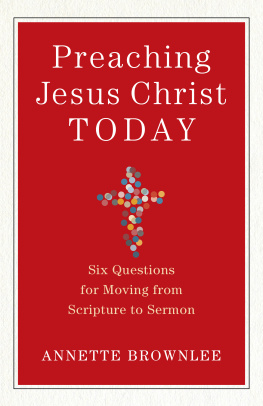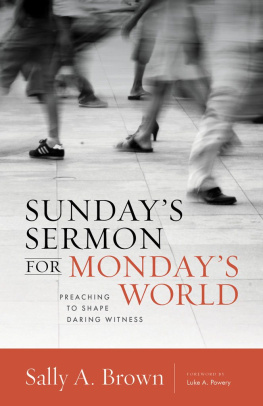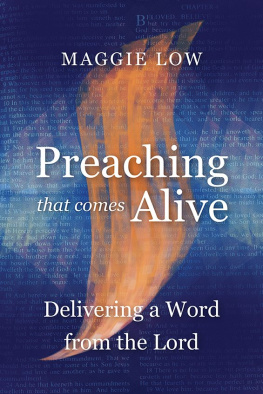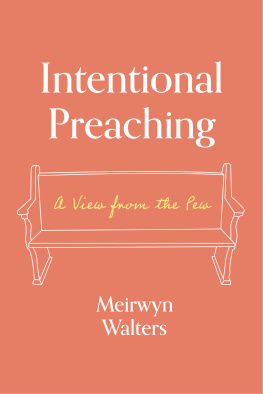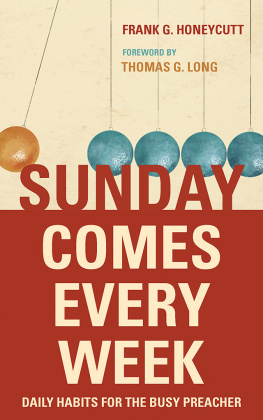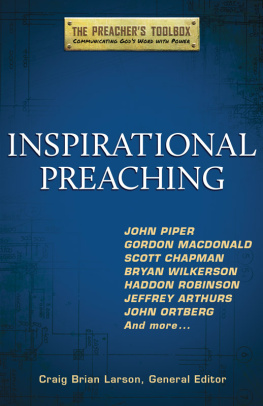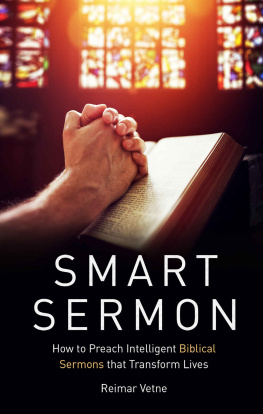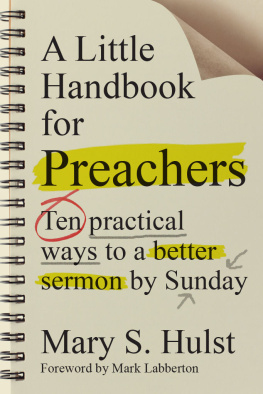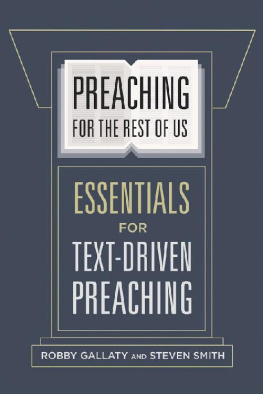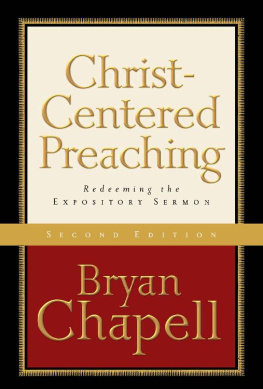Introduction: Listening to Scripture for Preaching: A Discipline in Need of Remediation
1. Question 1: What Do I See? The Preacher as Witness
2. Question 2: Whom Do I See? The Preacher as Witness to Christ
3. Question 3: What Is Christs Word to Me? The Preacher as Confessor
4. Question 4: What Is Christs Word to Us? The Preacher as Theologian
5. Question 5: What Is Christs Word about Us? The Preacher as Theologian of a Broken Body
6. Question 6: What Does It Look Like? The Preacher as Witness to Christ in a Disobedient World
7. Using the Six Questions: Sermon Form and Sermon Examples
Preface
Several years ago our daughter gave her father and me a small book for Christmas, The Asian Grocery Store Demystified . As the title suggests, the book takes the reader through the many unfamiliar vegetables and fruits sold in Asian markets and explains what they are and what to do with them in the kitchen. We love this book. We had recently moved to Toronto and bought a house near little Chinatown, just a block from its overflowing markets of strange fruits, vegetables, dried plants, and seafood. We cooked with the book, and over time we moved from sauting bok choy and Japanese eggplant to cooking amaranth and fuzzy melon. We love it all.
Though the analogy is limited, it offers guidelines for a theologically shaped practice of preaching Jesus Christ. It points the way for preachers to have more confidence in their knowledge of what to do in the strange world of Scriptures fruits and nuts. To claim Scripture as Gods word to usto claim it as authoritative in the church and in our livesis only a beginning for preachers. We preachers often need help in knowing what to do with these commitments in our sermons, especially in a world in which this claim carries little currency. The guidelines that follow take the form of six straightforward questions for listening to Scripture as one prepares sermons, week after week, and for moving from interpretation to sermon text in the midst of daily congregational life.
The inspiration for these guidelines comes out of the specific nature of the claim I am making: preaching Jesus Christ is a theological practice. Let me briefly say four things this claim implies, all of which I explore in the chapters to come.
First, preaching is theological. It is based on a variety of theological commitments, implicit or explicit, that shape how we read Scripture, preach from it, and move from Scripture to sermon in the context of worship and the church. As later chapters describe, these commitments have to do with what kind of text the preacher understands Scripture to be, the role of the church both in Gods purposes for creation and in the interpretation of Scripture, questions of the correlation or connection between Scripture and our worlds today, between then and now, and the role of the preacher in the pulpit and in the congregation. The chief theological claim on which this practice rests is this: the location of preaching in and for the church needs to be the primary business of preachers and must shape how they go about sermon preparation. Why? The church is the God-given soil in which Scripture, preacher, and people are rooted, and the Spirit uses Scripture to testify to the church and to form it into the Spirits witness to the nations. How might this theological claim shape how we as preachers read Scripture in sermon preparation, craft our sermons, understand our role, and use doctrine and personal stories? How does it shape our understanding of the role of sermons in discipleship and mission? These are questions this book addresses.
This project is part of the movement of theological retrieval that began with the postliberal theology of George Lindbeck and Hans Frei and has, more recently, moved into evangelical traditions.
Second, preaching is a practice. It is one practice among many in the church, all of which are a response to Gods gracious action through the Spirit. The nature of this response in preaching is that preachers need to do something with their interpretation of Scripture. Sermons involve a lot of movementfrom Scripture to sermon, from the beginning of a sermon to its end, from the preachers mouth to the peoples ears to everyones lives, from the gathered community out into the places people spend their weeksall in the context of worship and a specific culture. It doesnt matter whether pastors preach from a written text, from notes, or just wing it or whether they preach in a Baptist church, an Anglican church, or a caf. This movement is not primarily about sermon form, literary style, or holding the listeners (and the preachers) interest. It is about the power of God on the cross to bring into existence that which is not. In the synagogue in Thessalonica, Paul preaches about this power, the Messiah who suffers and rises from the dead; and what is the reaction of some who hear? They say, These people... have been turning the world upside down and send a mob in search of Paul and Silas (Acts 17:17; here v. 6).
Preachers need help knowing what to do with their theological commitments in their interpretation of Scripture and how to serve it up in a sermon. In my claim that preaching is a theological practice, I aim to expand the movement of theological retrieval to include not only the interpretation of Scripture but also the interpretation of Scripture for the practice of preaching.

